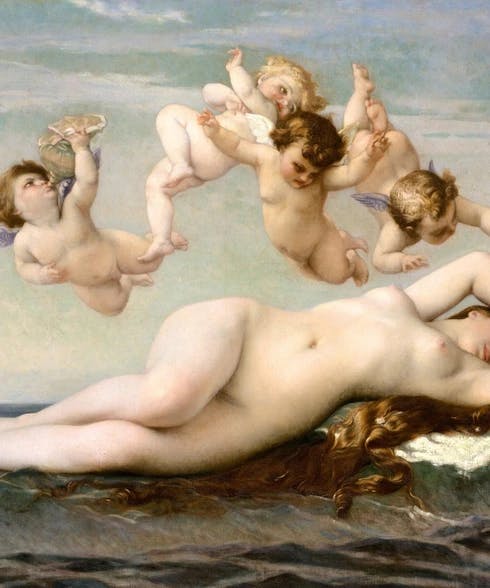The War On Beauty
Our world is at war with beauty. From the plastic and overwrought worlds of reality stars and Instagram influencers on the one hand to the body positivity movement celebrating morbid obesity on the other, we're bombarded by images of the grotesque.

Women are being sold false beauty ideals – or rather, that there is no "ideal." All bodies are beautiful, we're told relentlessly by the body positivity movement. And yet, when everything is beautiful, nothing is.
The ancient Greek philosopher Plato elevated Truth, Goodness, and Beauty and called them the Transcendentals or the properties of being. He connected these three properties with the human capacities to think, wish, and feel. Plato said that if we want to know something, what we can know about it is: what is true, what is right, and what is lovely.
Plato said that if we want to know something, what we can know about it is what is true, right, and lovely.
Modern Art
Yet modern American society struggles to say anything definitive about any of those three entities and doesn't believe they're fixed. Far from objective truth, we're told that "beauty is in the eye of the beholder." On Instagram, exhibitionists post absurdly artificial photos, with hyper-sexualization so extreme that art critic Camille Paglia likened it to the fertility totems of the Stone Age (like the Venus of Willendorf.) For Millennials, these "stilted, forced and strangely unsexy" photos have become a "wildly addictive genre of Instagram self-portraiture."
Far from objective truth, we're told that "beauty is in the eye of the beholder."
Contrast selfies and booty-pics with the self-portraits of Mexican artist Frida Kahlo: in one there is a fascinating interplay of light and dark, a tapestry of colors, and eyes alight with magic and mystery; the Instagram-fare, on the other hand, is depressingly garish, with dead eyes and fake body parts galore. "Visual illiteracy" of rising generations contributes to the ugliness of these photos, according to Paglia, but it's far from the only problem.
Body Positivity
Simultaneously, the "body positivity" movement is gaining steam. The movement encourages people to believe that everyone should have a positive self-image, and morbidly obese plus-size model Tess Holliday, who popularized the #EffYourBeautyStandards hashtag, is one of its biggest promoters.
Holliday is the author of a book called The Not So Subtle Art of Being a Fat Girl: Loving the Skin You're In. In an article promoting Holliday and criticizing the people that complain this trend glorifies obesity and unhealthy lifestyles, women's health magazine Self says "save your concern" about her health.
It's one thing for health magazines to encourage women to accept their bodies and to have positive self-esteem, but it's quite another to act as if America is not in the middle of an obesity epidemic. An estimated 160 million Americans are either obese or overweight. More than 60 percent of American women are in that category.
If you're considered to be overweight, losing as little as 5% of your body weight can lower your risk for several diseases, including heart disease and type 2 diabetes. The Self article doesn't mention any of that – but it does criticize people for "concern trolling" the health of Holliday and other plus-size models.
Losing as little as 5% of your body weight can lower your risk for heart disease and type 2 diabetes.
The razor brand Gillette jumped into the body positivity movement with their latest ad featuring plus-size model Anna O'Brien splashing in the sea alongside the words "go out there and slay the day."
The ad sparked controversy, which the body-positive crowd dubbed "fat phobia" and body shaming.
Closing Thoughts
It's unfortunate that we live in an age that refuses to find moderation in anything. It seems we catapulted from size-negative-zero fashion models to the glorification of severely overweight ones. While it's not our job to police the health of Holliday or O'Brien, no doctor would ever say that a morbidly obese lifestyle will not bring with it a myriad of health problems. Why can't women celebrate their bodies and their health?
It's heartening to see the inclusion of a diverse group of women – but let's hope that the fashion industry doesn't fetishize an equally unhealthy version of what women should look like. We should have role models who are both beautiful and healthy.